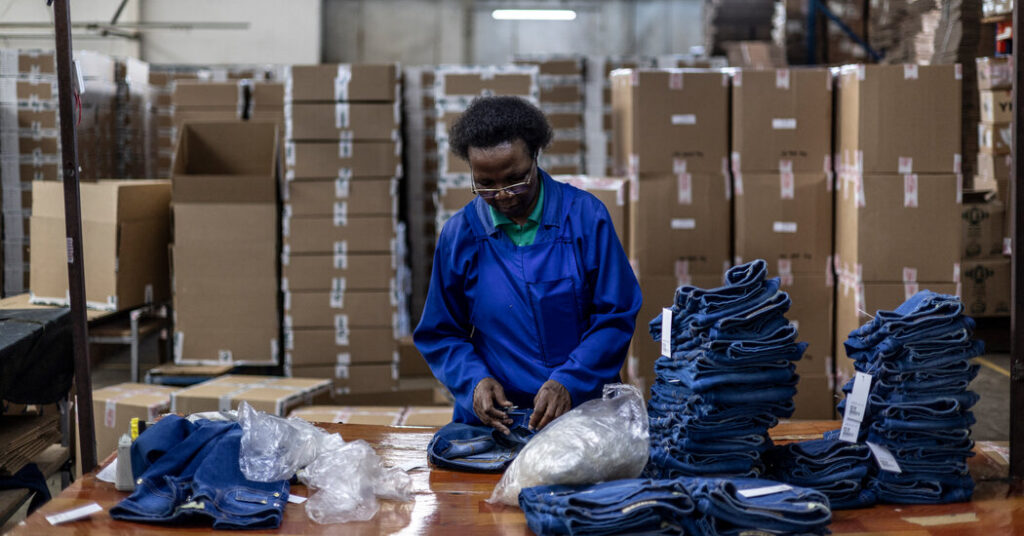The nation that the Trump administration slapped with the heftiest tariff this week is a small, rural, landlocked country in southern Africa that is among the world’s poorest.
Lesotho, which makes denim that goes into American-branded jeans, was hit with a 50 percent tariff. It was among several lower-income countries on the continent that were shocked by levies high above the minimum 10 percent imposed on nearly all of America’s trading partners. Madagascar, where three-quarters of the population lives in poverty, now will be met with a 47 percent tariff when its apparel, vanilla and other exports enter the United States.
Products from Algeria, Angola, Botswana, Libya and Mauritius all now have tariffs above 30 percent, as does South Africa, which has come under particular attack by the Trump administration.
Mr. Trump has justified the across-the-board tariffs by declaring that the world trading system has played the United States for a chump who picked up the tab for the world’s moochers.
But Lesotho is hardly a big player in global trade: It imported less than $3 million in goods from the United States and exported $240 million there last year.
The tariffs come as much of the African continent is already reeling. Just weeks ago, the Trump administration ended billions of dollars in aid to Africa that undergirded many countries’ health care systems and disaster relief efforts.
At the same time, governments across the continent are coping with a foreign debt load that exceeds $1.1 trillion. Many are spending more on repaying their loans than on health care or education.
For the most part, manufactured exports from Africa to the United States are minuscule. But to countries like Lesotho, the impact of tariffs is enormous. Exports of denim and diamonds make up more than a tenth of the country’s gross domestic product.
This will “devastate the economy,” said Jacques Nel, head of Africa Macro at Oxford Economics, a research firm. Lesotho is already a poor country. It has a population of two million and its entire national output is about $2 billion a year, with an annual per capita income of $975.
“This has nothing to do with actual tariffs,” Mr. Nel said. “They can’t import a lot from the U.S., because they don’t have a lot of money.”
The textile industry is Lesotho’s biggest private employer and produces its number-one export. The sector was nurtured after the United States passed the African Growth and Opportunity Act in 2000. Designed to boost manufacturing across the continent, the law removed most duties on goods from sub-Saharan Africa. That law expires later this year, although Mr. Trump effectively ended it this week.
Lesotho’s factories have made garments — particularly denim — for manufacturers like Levi’s and Wrangler. And although Mr. Trump recently called Lesotho a country that “nobody has ever heard of,” his own Trump-branded Greg Norman golf shirts feature labels that say “Made in Lesotho.”
Lesotho’s trade minister, Mokhethi Shelile, said the country has 11 factories that employ 12,000 workers. Seventy percent of what they produce is exported to the United States. “We are a small economy,” Mr. Shelile said. “We just have to speak to the U.S. administration because the tariff is not based on facts.”
Other top exporters of textiles in Africa, like Madagascar (47 percent tariff) and Kenya (10 percent), will also feel the sting.
Because South Africa does more trade with the United States, exporting automobiles, agricultural goods and more, it will be most affected, said Thea Fourie at S&P Global Market Intelligence.
African nations whose major exports are energy or certain critical minerals will be spared because the administration has exempted those items from tariffs.
While the United States is imposing tariffs on the relatively small amount of goods from Africa — just $39 billion worth last year — China has been trying to encourage trade. It eliminated all import duties on products from 33 African countries in December.
A bigger concern is the knock-on effects that the tariffs are expected to have on the global economy. The outlook has dimmed over the past week and analysts are expecting slower growth.
“Even African countries not facing very high tariffs are going to be suffering,” said Jayati Ghosh, an economist at the University of Massachusetts at Amherst.
As is the case with any global downturn, the poorest countries will feel the sharpest effects. Worsening economic prospects could slow trade with other partners like China and Europe. It also discourages investors.
If inflation prompts central banks to raise interest rates, African countries with large debt burdens are in for a double whammy. Their loan payments — most of which are priced in dollars — will increase at the same time that their ability to earn foreign exchange through exports is crippled.
Mavis Owusu-Gyamfi, the executive vice president of the African Center for Economic Transformation, said the only way forward is to develop regional trade networks within the continent, a long-running goal.
The continent has to look for “opportunities to build intra-African trade,” she said.
Zimasa Matiwane contributed reporting from Lesotho.
https://www.nytimes.com/2025/04/05/business/economy/when-huge-trump-tariffs-hit-small-african-economies.html


